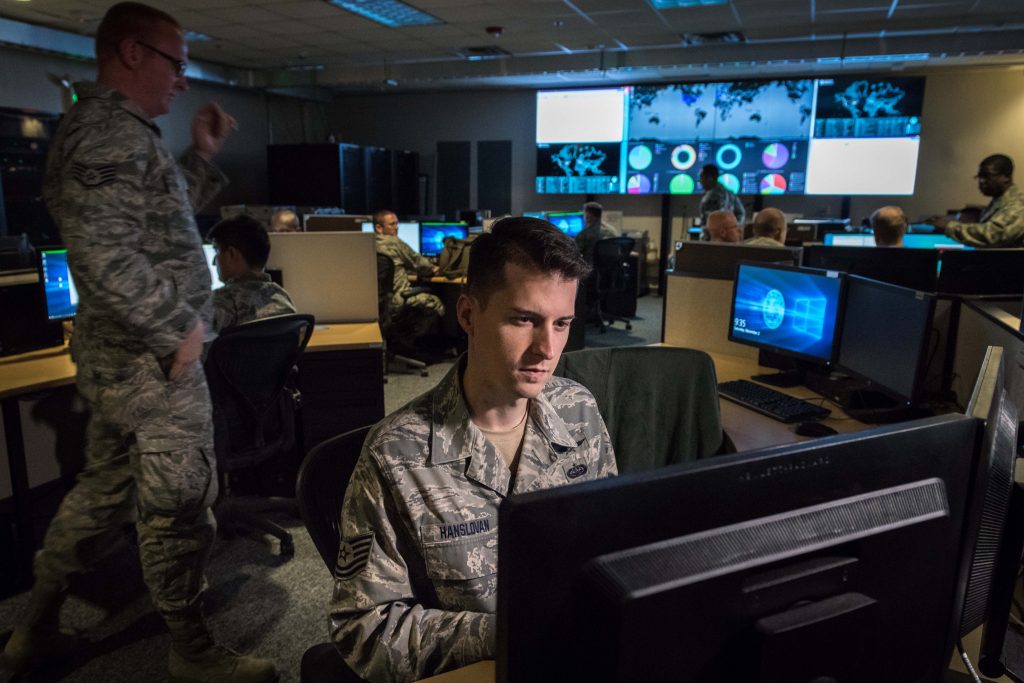Experts say CSRA power grid likely not a target for a major cyber attack
With a hot war raging in Ukraine, menacing comments from Moscow about nuclear war and the looming threat that Russia’s aggression could spill over into more neighboring countries causing NATO to become directly involved, officials in America are preparing for cyberattacks that could come as retaliation U.S. aid to Ukraine.
Experts, however, say there is little for Augustans to fear. They say that a direct Russian attack on the CSRA’s power grid is unlikely.
[adrotate banner=”51″]
Over the past decade, Augusta become ground zero for the U.S. military’s communication and cyber commands. Such growth has led Augusta University to greatly expand its cyber program with plans to add at least 30 new faculty in the near future, Alexander Schwarzmann, dean of Augusta University School of Computer and Cyber Science, told AU retirees.
Recently, President Joe Biden announced $200 million in military aid to Ukraine. Part of that military aid will be provided by the Army Cyber Command, which is active on the tech front.
Such actions might lead to the speculation that the Army Cyber Command itself is in the crosshairs of Russian hackers. It might seem logical that the easiest way for Russia to hamper the Army Cyber Command’s operations would be to simply attack Augusta’s power grid and take the entire operation off-line.
However, Richmond County Sheriff Chief Deputy Pat Clayton says that pulling the plug on Augusta’s power will do absolutely nothing other than cause a mild inconvenience to the Army Cyber Command.
“I can’t say too much, but I can tell you that they have massive back-up generators, so hacking into Augusta’s power grid would not slow them down at all,” Clayton said.
[adrotate banner=”20″]
A greater danger would be for hackers to interfere with the banking system, and officials in New York City have announced that the financial sector there is on high alert.
Such an attack on the nation’s financial hub would impact the CSRA, but a source within Army Cyber Command who wishes not to be named says that the Russians know that if such an attack be traced back to them, the American response would be devastating.
“They probably only know a quarter of our capabilities, if that. We have capabilities that they could not even dream of,” the unnamed source said.

Michael Nowatkowski, assistant professor at Augusta University’s College of Computer and Cyber Science, agrees and says that the biggest cyber threat to the average Augustan is not from the Russian military, but rather from scammers looking to profit off of the carnage in Ukraine.
“Anytime something like this or a natural disaster happens, you always have people taking advantage of the crisis by attempting to use people’s generosity to commit identity theft,” Nowatkowski said.
According to Nowatkowski, the best protection is not to engage anyone soliciting donations over the internet. Instead, he advises those who want to help Ukranians to use a known entity such as the Red Cross.
Nowatkowski says that it is important for people to understand that the world wide web, and especially social media, is fraught with danger. Something as simple as posting birthdays on Facebook, posting pictures of hobbies or responding to questionnaires that ask seemingly harmless questions such as a favorite high school teacher or first automobile owed can help online criminals build a portrait of a potential victim.
[adrotate banner=”15″]
According to Nowatkowski, something as innocent as posting a picture of a pet of a certain breed can help scammers build a profile and use Fido as an electronic Trojan Horse.
“Some people might call me paranoid, but I am not on social media at all. I do not save my passwords or use password managers,” Nowatkowski said.
In the highly unlikely event Russian hackers found a way to target the CSRA’s electrical grid, Clayton says that the local government is prepared. He noted that during the ice storm of 2014, which left most of the CSRA without power for four days, most grocery stores remained open and the generators at the Sheriff’s Office kept headquarters in communication with officers on the streets.
“We had a good dry run for such a thing with the ice storm. We know where to place our people in terms of traffic control. An attack like that might slow things down, but it would by no means grind things to a halt,” Clayton said.
Scott Hudson is the senior reporter for The Augusta Press. Reach him at scott@theaugustapress.com
Facts about the Cyber Command in Augusta

Mission statement: “U.S. Army Cyber Command integrates and conducts cyberspace operations, electromagnetic warfare and information operations, ensuring decision dominance and freedom of action for friendly forces in and through the cyber domain and the information dimension, while denying the same to our adversaries.”
Army Cyber Command by the numbers
According to the trifold brochure for the Army Cyber Command,
- The Cyber Command conducts defensive, offensive and network operations around the world
- The Cyber Command annual budget is $1.5 billion
- The Cyber Command employs 6,500 soldiers and 10,000 civilians and civilian contractors
- The Cyber Command has five world-wide Regional Cyber Centers. Those include Fort Huachuca, Ariz., Wiesbaden, Germany; Camp Walker, Korea; Fort Shafter, Hawaii; and Camp Arifjan, Kuwait.
- The Cyber Command has 41 active cyber teams
- The Cyber Command’s watch words are Operate, Defend, Attack, Influence
To read more about the Cyber Command, check out its website at www.arcyber.army.mil or www.army.mil/armycyber












